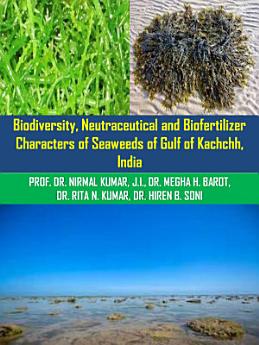Biodiversity, Neutraceutical and Biofertilizer Characters of Seaweeds of Gulf of Kachchh, India
About this ebook
About the author
Prof. Dr. Nirmal Kumar, J.I. is currently working as a Professor and Head, P.G. Department of Environmental Science and Technology (EST) at Institute of Science & Technology for Advanced Studies & Research (ISTAR), Vallabh Vidyanagar (Dist. Anand), Gujarat (India), where he teaches various post-graduate and PhD-level courses, and guiding research projects at the PhD (guided 19 PhDs, 2 more pursuing) and Masters levels. His research interests include bioremediation, biodegradation, nanoscience and technology, biodiversity and conservation, wetland pollution monitoring, forest nutrient dynamics, ecology, environmental biology, etc. He has received 15 major research projects from various national funding agencies, including Ministry of Environment & Forests (MoEF) (India), Ministry of Earth Sciences (India), University Grants Commission, New Delhi, Gujarat State Forest Department, among others. He has 34 years of research and 30 years of teaching experience and has published more than 215 research papers in peer reviewed international and national journals and proceedings (www.nirmalkumarji.in, https://vidwan.inflibnet.ac.
Dr. Rita N. Kumar is currently working as a Head, Department of Biological & Environmental Science at N.V. Patel College of Pure & Applied Sciences (NVPAS), Vallabh Vidyanagar (Dist. Anand), Gujarat (India). She is involved in teaching various under-graduate and PhD-level courses, and guiding many state level and national level research projects and doctoral students at the PhD level. Her research areas include ecology, environmental biology, biodiversity and conservation, aquatic pollution, floristic study, forest nutrient dynamics, bioremediation, phytoremediation, and air pollution and climate change. She has completed 10 major research projects from various national funding agencies, including Ministry of Environment & Forests (MoEF) (India), Ministry of Earth Sciences (India), University Grants Commission, New Delhi, Gujarat State Forest Department, and many others. She has 34 years of research and 30 years of teaching experience. She has more than 175 research papers to her credit in peer-reviewed international and national journals. Dr. Rita Kumar has attended, chaired, and presented various papers at international and national conferences. In addition, she is a member of several professional bodies at state and national levels. Dr. R.N. Kumar has received several best paper and academia awards and has developed national collaborations for executing research and student exchange programs.
Dr. Hiren B. Soni has 24 years of research and 16 years of academic experience in diverse fields such as Systematic Zoology (Invertebrates & Vertebrates), Ornithology & Wildlife Biology, Field Biology (Biodiversity & Conservation), Environmental Impact Assessment (EIA), Wetland Biology (Biodiversity, Ecology, Restoration, Management), Bioremediation (Phytoremediation), and Ecotoxicology. He is well-versed in He is credited with more than 150 publications including research papers, scientific articles, popular publications, book chapters and books at national and international levels. Moreover, Dr. Hiren B. Soni is voluntarily serving as Associate Editor, Certified Reviewer of Publons Academy (UK), Deputy Editor, Editorial Advisory Board Member, Editorial Book Reviewer, Editor-in-Charge, Managing Editor, Manuscript Editor, Panel Reviewer and Senior Editor in international publishing houses e.g. Springer, Elsevier, Taylor & Francis etc. He is also affiliated with Nature Publishing Group as a Potential Reviewer in Nature Journal (Environment & Ecology), Scientific Data Journal (Ecology, Environment, Biodiversity, Conservation) and Nature Communications (Earth & Environment). Dr. Hiren B. Soni is also acting as Environmental Consultant (Advisory Member) in Hanell International, Zimbabwe (South Africa).






